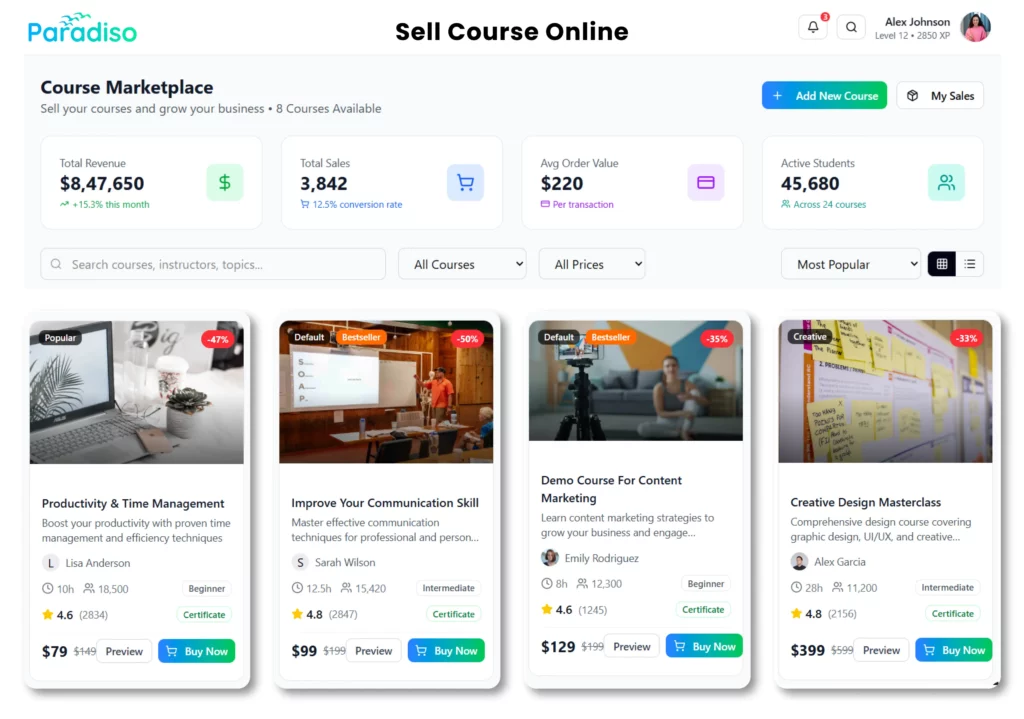You’ve probably asked yourself this question more than once: “How do I keep my learners motivated on a free LMS?”
It’s a real challenge. You invest time creating training materials, but then… learners click through half-heartedly, skip videos, or never log back in. Frustrating, right? And when you’re using a free platform, you might feel even more limited—like you don’t have the same engagement features that big-budget systems offer.
But here’s the good news: learner engagement with a free LMS is absolutely possible. With the right strategies, you can turn even basic tools into an engaging experience learners actually enjoy. Let’s explore how.
Boost learner engagement today—Try Paradiso Free LMS and Make Every Course Interactive!
Simple, Effective Learning That Keeps Your Team Motivated.
Why Engagement Is the Heart of Learning
Think about it—an LMS is only useful if people are genuinely learning. Without engagement, your content becomes background noise. With it, learners absorb information, apply it in real life, and actually look forward to training.
Take onboarding as an example. Imagine a new hire rushing through slides just to finish a compliance course. Compare that to another new hire who answers fun scenario-based questions, shares ideas with peers, and gets recognition for progress. Who do you think will remember more—and feel more confident?
That’s the difference engagement makes. And yes, you can achieve it on a free LMS.
The Struggles You’re Facing (And Why They’re Normal)
If you’ve been frustrated, you’re not alone. Most organizations starting with free LMS platforms face the same hurdles:
- Minimal features: Limited gamification, branding, or reporting.
- Low motivation: Learners see it as “just another task.”
- Overloaded content: Long videos or walls of text put learners off.
- Tracking gaps: Harder to see what’s working and what isn’t.
The important thing is this: these challenges aren’t roadblocks. They’re opportunities to rethink how you design learning.
Practical Ways to Boost Learner Engagement with a Free LMS
1. Think Small: Microlearning Wins
Break content into short, focused lessons. Five minutes of learning feels doable; an hour-long video feels like a chore.
💡 Example: Instead of one long compliance video, create short modules with quick “check your knowledge” questions.
2. Add Interactivity Where You Can
Even the simplest LMS usually supports quizzes and discussions. Use them! Ask learners to apply knowledge, not just recall it.
💡 Scenario-based quizzes work wonders. For sales training, ask: “Your client raises this objection—what would you do?”
3. Make It Visual, Not Text-Heavy
Walls of text don’t stick. Use free tools like Canva for infographics or Loom for short screen recordings. Visuals break monotony and make learning memorable.
💡 Example: Replace a text-heavy product manual with a series of visually engaging slides highlighting key features.
🚀 Ready to See Paradiso LMS in Action?
Let's show you how Paradiso LMS can work for you.
🎯 Get a Free LMS Now4. Gamify Creatively
No built-in badges? No problem. Recognize learners in team meetings, send “top performer” shoutouts via email, or design simple certificates. Recognition matters more than the tech.
💡 Pro tip: Create a leaderboard in a shared document or Slack channel to encourage friendly competition.
5. Personalize the Path
Relevance drives engagement. Assign content by role, skill level, or interest, even on a free plan. Learners are more motivated when training feels tailored for them.
💡 Example: Segment onboarding content so that sales teams see different examples than support staff.
6. Build Community Around Learning
Learning sticks better when shared. Encourage discussions, peer tips, or group challenges.
💡 Example: After a customer service module, ask learners to share their best real-life experiences in a discussion forum.
7. Celebrate Progress—Loudly
Even if your free LMS only shows basic tracking, use it to motivate. Simple progress emails like “You’ve completed 70%—almost there!” make learners feel accomplished.
💡 Pro tip: Send a monthly “Top Learners” email to acknowledge participation.
8. Use Real-World Scenarios
Abstract concepts are boring. Bring learning to life with scenarios your learners face daily. This makes training relevant and memorable.
💡 Example: For safety training, present a scenario: “A co-worker spills chemicals—what steps do you take?”
9. Incorporate Reflection and Self-Assessment
Encourage learners to pause and reflect on what they’ve learned. Free LMS platforms can host short surveys or journaling exercises. Reflection reinforces retention.
💡 Example: End each module with a prompt: “How can you apply this skill in your daily work?”
10. Leverage Peer Learning and Mentorship
Pair learners together for discussion or assignments. Learning from peers boosts engagement and builds a supportive community.
💡 Example: Assign small group projects or peer quizzes to encourage collaboration.
11. Add Humor and Storytelling
Even simple content can become more engaging if it tells a story or makes learners smile. Humor and relatable examples keep attention high.
💡 Example: Turn a boring policy into a fun comic strip or short story scenario.
12. Communicate Frequently and Positively
Don’t just upload courses—stay connected. Remind learners of progress, congratulate milestones, and share success stories. Positive communication keeps motivation high.
💡 Tip: Weekly “learning tip” emails can encourage returning learners without feeling pushy.
Communication: The Secret Engagement Tool
Many admins overlook this, but communication can make or break engagement. When learners feel supported instead of pushed, they engage more deeply.
- Send reminders and motivational notes.
- Share real success stories of people applying what they learned.
- Ask for feedback after each course—learners love being heard.
The Big Takeaway
If you’ve been worrying that a free LMS means disengaged learners, don’t. The truth is, learner engagement with a free LMS depends less on features and more on experience design.
With microlearning, interactivity, personalization, recognition, and communication, you can make training sessions learners genuinely enjoy. Start small, listen to feedback, and improve as you go.














